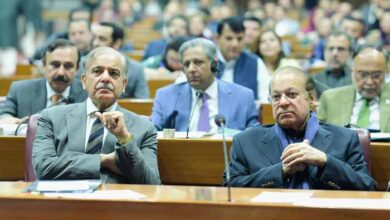ISLAMABAD: Following approval by the federal cabinet, the 27th Constitutional Amendment Bill was formally introduced in the Senate on Saturday, where Chairman Yousuf Raza Gillani referred it to the Standing Committee on Law and Justice for detailed review.
During the Senate session, Law Minister Azam Nazeer Tarar presented the bill and proposed suspending routine proceedings to allow its introduction — a motion approved by the chair. Tarar stated that the bill would now be reviewed by a joint parliamentary committee comprising members of both the National Assembly and the Senate, emphasising that no immediate vote would be held and that opposition input would be sought before moving forward.
Chairman Gilani urged opposition lawmakers to participate actively in committee discussions, confirming that the bill had been formally referred to the Law and Justice Committee.
Earlier, the bill was approved by the federal cabinet, chaired virtually by Prime Minister Shehbaz Sharif from Azerbaijan, before being presented to the Senate for debate.
Key provisions of 27th Constitutional Amendment Bill
According to the draft obtained by Dunya News, the 27th Amendment proposes sweeping changes to Pakistan’s judicial and defense structures, including:
Establishment of a Federal Constitutional Court
A new Federal Constitutional Court (FCC) would be created to interpret the Constitution and decide constitutional disputes.
Constitutional powers currently held by the Supreme Court—including suo motu authority (Article 184)—would be transferred to the new court.
The Supreme Court would henceforth deal only with appeals and general legal matters.
The FCC would consist of a Chief Justice and judges representing all four provinces equally, with the Chief Justice serving a three-year term.
The status of the Chief Justice of Pakistan would be redefined and limited.
FCC decisions would be binding on all courts across Pakistan.
Defence restructuring: Chief of Defence Forces
The amendment proposes abolishing the post of Chairman Joint Chiefs of Staff Committee and introducing the title “Chief of Defence Forces” (CDF), to be held by the Army Chief.
Senior military ranks such as Field Marshal would receive lifetime status under the new constitutional provision.
Judicial appointments reform
The appointment process for judges would change, giving the Prime Minister and President a central role.
Both the Chief Justices of the Supreme Court and the Federal Constitutional Court would be part of the Judicial Commission for appointments.
Parliament would determine the number of judges serving in the new Constitutional Court.
Constitutional articles to be amended
The proposed amendment affects Articles 42, 63A, and 175–191, significantly reducing the powers of the Supreme Court and redistributing authority between the judiciary and the executive.
Reaction, political implications
Legal experts have described the 27th Amendment as a major transformation of Pakistan’s judicial and administrative balance, while opposition parties have voiced strong reservations, warning it could undermine judicial independence.
The proposal to establish a Federal Constitutional Court has already sparked intense political and legal debate, with analysts predicting far-reaching implications for the country’s power structure.







